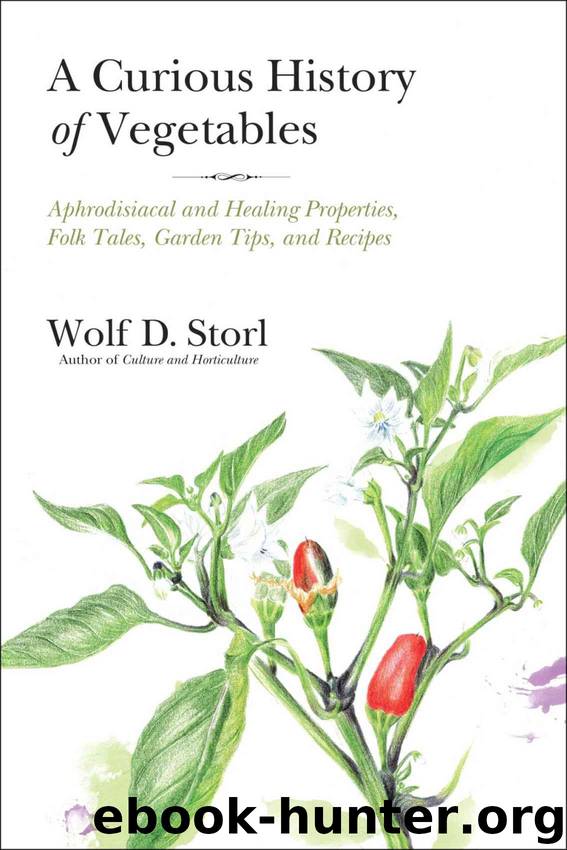A Curious History of Vegetables: Aphrodisiacal and Healing Properties, Folk Tales, Garden Tips, and Recipes by Wolf D. Storl

Author:Wolf D. Storl [Storl, Wolf D.]
Language: eng
Format: epub
Tags: CKB085000 Cooking / Specific Ingredients / Vegetables
ISBN: 9781623170400
Publisher: North Atlantic Books
Published: 2016-06-13T21:00:00+00:00
Peas porridge hot, peas porridge cold,
Peas porridge in the pot, nine days old.
—Traditional English nursery rhyme, ~1760
The Pea As a Healing Plant
It would seem that such a revered plant would also play an important role in healing lore, but that is not the case. Nursing mothers traditionally applied peas porridge to treat their nipples when they were sore from nursing—but this was probably nothing more “sympathetic medicine,” as peas resemble taut nipples. Similar “sympathetic magic” was practiced when the birth pains began. Peas were put over the fire; when they began to cook—according to the belief—the birth would take place. Peas were also said to cure warts. The unsightly verruga was rubbed with a pea, after which it was put in a satchel and thrown out; whoever later picks up the bag by chance will get the wart. (This cure is considered even more effective using a pea stolen from a neighbor’s field.)
It was not until the twentieth century that the pea revealed its hidden medicinal properties. Peas are good for diabetics; they can lower harmful LDS cholesterol and, to a small degree, blood sugar levels. They are also helpful in cancer and AIDS diets because they contain protease inhibitors, which trap oxygen radicals and reduce inflammation. As a result of British research in 1986, it was discovered by chance that pea dishes help prevent appendicitis.
Dr. S. N. Sanyal, a biophysicist from the University of Calcutta, “discovered” that the pea, long considered a symbol of fertility, is actually rich with contraceptive substances. It contains m-Xylohydroquinone, which dampens fertility by intervening in the production of progesterone and estrogen. Dr. Sanyal showed that female fertility was reduced by up to 60 percent; for males the sperm count was substantially lessened. But such was, indeed, merely scientific verification of what Asian medicine had already long known; Indian women have traditionally cooked a soup out of pea pods in order to delay conception. Interestingly, in Tibet, where peas are a major source of nourishment, the population remained stable over hundreds of years. (Carper 1988, 180) Note, however, that this is not to say that pea extract can effectively replace the near-perfect efficacy of the birth control pill.
Why does the pea produce sexual hormones, as do other pulses? Ecologists presume that via these hormones such plants practice birth control on their natural predators. How so? At times when the climate is too cold or too dry for optimal growth, the plants produce these hormones in abundance so as to reduce the chance of being consumed out of existence. But during optimal conditions, when they themselves are abundant, they produce such small amounts of these fertility-reducing hormones that they have little or no influence on their predators.
It seems that the deva of this particular philanthropic legume still communicates actively with the more sensitive among us. It was through the pea that Augustinian monk Gregor Mendel (1822–1884) discovered the laws of genetic inheritance. For years in his cloister garden in Brno, Moravia, he tirelessly crossed smooth yellow peas with wrinkled green ones, recording the results.
Download
This site does not store any files on its server. We only index and link to content provided by other sites. Please contact the content providers to delete copyright contents if any and email us, we'll remove relevant links or contents immediately.
Turbulence by E. J. Noyes(8040)
The Thirst by Nesbo Jo(6932)
Gerald's Game by Stephen King(4642)
Be in a Treehouse by Pete Nelson(4038)
Marijuana Grower's Handbook by Ed Rosenthal(3677)
The Sprouting Book by Ann Wigmore(3587)
The Red Files by Lee Winter(3412)
The Remains of the Day by Kazuo Ishiguro(3398)
Sharp Objects: A Novel by Gillian Flynn(3005)
Christian (The Protectors Book 1) by L. Ann Marie(2690)
Organic Mushroom Farming and Mycoremediation by Tradd Cotter(2689)
The Culinary Herbal by Susan Belsinger(2477)
Stone Building by Kevin Gardner(2392)
The Starter Garden Handbook by Alice Mary Alvrez(2335)
Lilac Girls by Martha Hall Kelly(2300)
The Unlikely Pilgrimage of Harold Fry by Rachel Joyce(2269)
The Lean Farm Guide to Growing Vegetables: More In-Depth Lean Techniques for Efficient Organic Production by Ben Hartman(2135)
Urban Farming by Thomas Fox(2102)
Backyard Woodland by Josh VanBrakle(1924)
